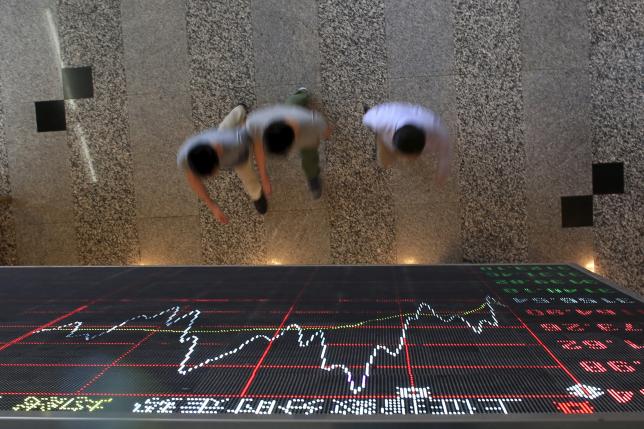Asia extends global gains, China PMIs taken in stride

TOKYO - Asian stocks rose on Thursday, drawing strength from overnight gains in global equities markets following their weakest quarter in four years, while twin surveys showing persistent weakness in China's manufacturing sector were taken in stride.
Spreadbetters saw the upward momentum in equities being retained in Europe, forecasting a higher open for Britain's FTSE, Germany's DAX and France's CAC.
The final Caixin/Markit China Manufacturing Purchasing Managers' Index (PMI) for September was slightly down from August but was a touch higher than a preliminary reading, a survey released on Thursday showed.
China's official PMI released separately inched up to 49.8 in September from the previous month's reading of 49.7, though it still showed contraction for the second straight month.
The Australian dollar, used as a proxy of China-related trades, rose 0.5 percent to $0.7058 on apparent relief the PMIs weren't as bad as some had feared.
Chinese financial markets are closed Oct. 1 to Oct. 7 for national holidays.
The Aussie's gain was modest, however, as the PMI suggested economic conditions were still deteriorating despite a raft of government stimulus measures.
"This indicates the continued weakness of the manufacturing industry, though the pressure driving the sector's decline has eased," said He Fan, Chief Economist at Caixin Insight Group, regarding the PMI.
"Tepid demand is a main factor behind the oversupply of manufacturing and why it has not recovered," said He.
MSCI's broadest index of Asia-Pacific shares outside Japan rose 1.2 percent to pull further away from a 3-year low struck early in the week.
Australian shares were 1.8 percent higher. Japan's Nikkei took a lacklustre central bank "tankan" survey on business sentiment in stride, climbing 2.3 percent.
On Wednesday, global equities ended their worst quarter since the 2011 euro zone crisis on an upbeat note, rallying on hopes Wall Street had bottomed for the time being. The Dow and S&P 500 surged overnight as bargain hunters scooped up beaten-down shares.
In currencies on Thursday, the dollar stood tall after an overnight boost from an upbeat US private-sector employment report.
US private employers added 200,000 jobs in September, according to the ADP National Employment Report, beating forecasts and hinting jobs growth may be sufficient for the Federal Reserve to raise interest rates later this year.
In September, the Fed opted against hiking interest rates, citing concerns about global risks and market tumult stemming from China. But in recent days top policymakers including Chair Janet Yellen have said the Fed could raise rates this year if the economy improves.
The euro dipped 0.3 percent to at $1.1147 after shedding 0.6 percent overnight. The dollar rose 0.3 percent to 120.24 yen after nudging up overnight versus its Japanese counterpart.
"The China readings were almost flat, not really an improvement, but a few people might have used the figures as an excuse to increase dollar-long positions with China closed today," said Masashi Murata, currency strategist for Brown Brothers Harriman in Tokyo.
"The big pictures is still that the outlook for the global economy remains very subdued, mainly due to weak Chinese growth," Murata said.
As with stocks, commodities got a breather amid the lull in global risk aversion, with copper and nickel rallying as bearish investors closed out quarter-end positions and ahead of the Chinese holidays.
Industrial metals were boosted by a bounce in the shares of hard-hit commodity group Glencore.
Three-month copper on the London Metal Exchange was up 1.2 percent at $5,223.50 a tonne after hitting 2-week highs.
Nickel hovered near a 4-week high of $10,465.00 a tonne.
US crude was up 1.3 percent at $45.70 a barrel despite data showing a surge in US crude oil and gasoline stocks last week, riding on overnight momentum generated by quarter-end "window dressing" by investors. Brent crude rose 0.8 percent to $48.83 a barrel. -Reuters







